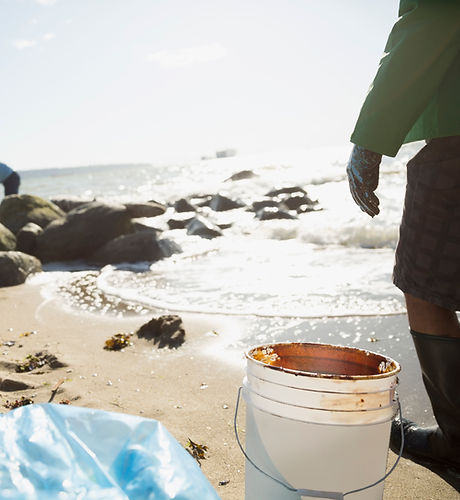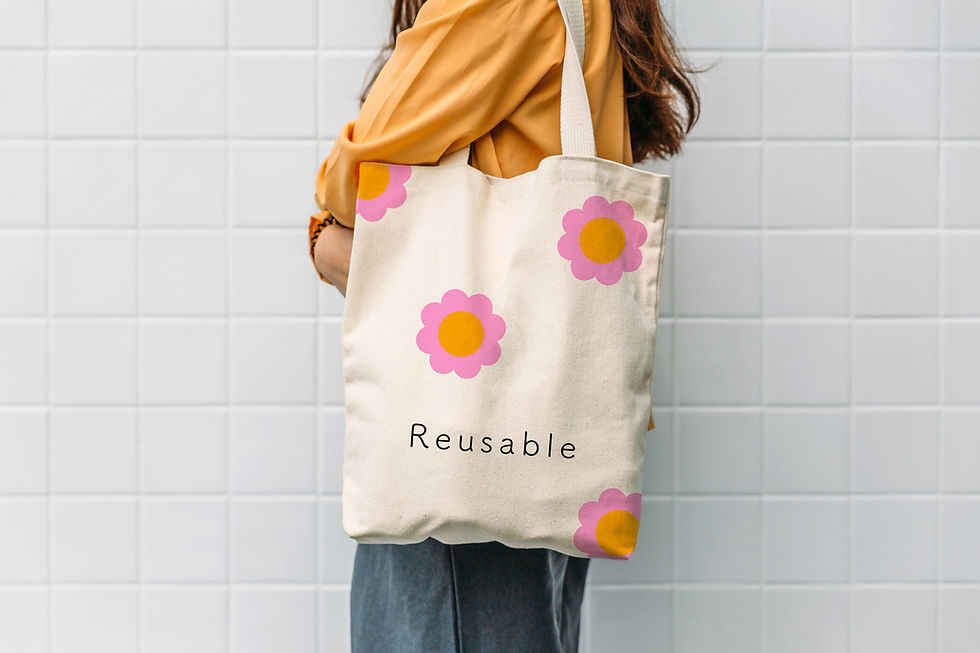
LET'S TALK CORAL REEFS
and what we can do to help
WHAT IS A CORAL REEF?
These reefs are an underwater ecosystem that are formed by coral, skeletons of colonial marine invertebrates. Coral is made from calcium carbonate which protects their soft bodies. Individual coral are made up of thousands of "polyps". Each polyp is a soft-bodied organism that combines with millions of other polyps to form a single piece of coral. Inside the polyp tissue is where photosynthesis happens which is how these living animals get their food. Coral grows on pre-existing coral, which overtime gets them to the massive size they are.
WHY ARE CORAL REEFS IMPORTANT?
Not only are coral reefs breathtaking to see up close, they are extremely important to the ocean environment. They are home to more than 4,000 species of fish, 800 hard coral species and many other organisms. Coral reefs take almost all of the energy out of storms, floods, and massive waves which prevents erosion, loss of structures, and even deaths. Reefs are also a key supporter of billion-dollar industries such as tourism and fishing.
WHY ARE THE CORAL REEFS IN DANGER?
Coral reefs are in danger due to disease, pollution, and destruction of their habitats. Although smaller issues such as placement of anchors and recreational misuse play a big part in this, the most important reasons are global warming and pollution. The warming of the water causes shortages in the coral's available food, leaving a great amount of stress on the coral. Coral reefs can also be wiped out by bleaching, a process where entire colonies are put under too much stress, expel their algae and turn completely white. One of the most famous cases of coral bleaching is happening right now with the Great Barrier Reef.
WHAT WE CAN DO TO HELP

REEF SAFE SUNSCREEN
Sunscreen can be extremely harmful to the reefs if they contain ingredients like oxybenzone, octinoxate, and butylparaben which can cause coral bleaching. Over 90% of the Great Barrier Reefs have become bleached and 50% of coral has died since 2016. California will hopefully follow in Hawaii's steps to ban the sale of non-reef safe sunscreen, but until then there are many affordable reef safe options to use.

VOLUNTEER AT LOCAL BEACH CLEANUPS
Starting small and volunteering at a local beach cleanup can make a big difference. Removing any amount of debris from beaches will reduce the effects of pollution on our oceans. Plastic and trash that gets into the water can seriously hurt marine life or have toxic chemicals that can hurt the reefs. If joining a beach clean up isn't in your schedule, consider picking up a piece of trash you see next time you are enjoying a relaxing day at the beach. Small steps make a big difference!

REDUCE WATER USE
We often hear this a lot, given that water waste is bad for the environment, although it is a necessity for life. If the coral reefs are in the ocean, then how does reducing water use benefit them? By limiting our water usage, we are limiting the amount of water runoff that will pollute our oceans because it can contain harmful chemicals & bacteria.

RESPONSIBLE TOURISM
We have all been involved in tourism at some point in our lives whether that is on a vacation or visiting another local beach and exploring. Often when we explore a new place we are very curious and when exploring the ocean it is important to be cautious. Boat anchors are a major cause of damaged coral when they are dropped in a spot over the reefs, crushing them when they are hit. Snorkleing is another common activity done so people can see these reefs and sea life up close. Even when no signs are in place, it is extremely important to never touch any coral or sea life. If the coral reefs are touched, this damages the protective layer and causes coral to be stressed which leads to the event of bleaching which can end in the coral dying. Next time you dive in and explore the ocean, keep in mind that it is the home to so many living things. Be cautious of your movements and keep your distance. The ocean is a visiting spot for us, but a home to billions.
Global Warming
The term "global warming" is often thought to be an issue in the air, so when scientists are alarmed when temperatures raise one or two degrees people are not phased or do not understand the severity. When the ocean temperature increases, it is like your body temperature increasing which is alarming. If our bodies were to stay two degrees above normal forever, we would not survive. Coral bleaching is the corals way of relieving the stress, just like our bodies having a fever. Bleaching causes them to starve and in most cases die. Unlike a human body where small amounts of warmth can be survivable, this isn't the case with our beautiful coral
Protection from Floods
Without these massive coral reefs, nearby towns and cities would have a much higher risk for natural disasters. The chance for floods, cyclones, and big waves are decreased as a result of having these reefs. Coral reefs are natural break waters which are sturdier and more reliable than man made break waters. These reefs absorb as much as 97% of the waves energy, so without them flooding would be very common and much more deadly.

Source of Food

Protein is an element we all need in our diets, one of the most common protein sources being fish. Without reefs, 25% of fish wouldn't be able to survive as they depend on healthy reefs. Over half a million people rely on coral reefs for the fish that are their primary source of food, without them they would be malnourished. When a reef dies, it is very alarming for the local communities as they depend on this reef. Healthy coral reefs provide health benefits to humans as well as the countless number of sea creatures.
Medicine from the Sea
Coral reefs are extremely beneficial in all aspects of life. Not only do they provide us with a source of protein, but more and more medicines that help humans fight cancer, viral infections, etc are from the ocean. One being prostaglandins, a cancer fighting drug, which comes from sea fans. Sea fans are bright colored animals that resemble a fan. Coral also has the molecule 11-dehydrosinularolide in them which is shown to protect the brain from the harmful effects of inflammation, seen in Parkinson's. Sunscreen companies are hopping on this discovery and using a substance in coral that protects from the suns ultraviolet rays. As more substances found in coral are discovered and our studies in science improve, we will rely on the coral reefs for further medical improvements. Keep in mind, without these reefs, we would be losing out on opportunities to better the health of all humans. Healthy reefs lead to healthy lives for all!
Plastic in the Seas
In our oceans, 80% of the debris is plastic that humans use. Marine species often die from digesting this plastic or getting tangled in it and the problem is only getting worse. Plastic pollution is harmful to ocean life, humans and climate change. It is estimated that 14 million tons of plastic end up in the seas with no sign of improvement. The number one thing we can do to help is be educated and aware of what is going on because many do not realize the severity of this. By reducing our plastic usage and choosing to use less single-use plastics we can make a change. Reusable bags, water bottles, and masks are common ways to help out. Go out and make a difference to a major problem!









